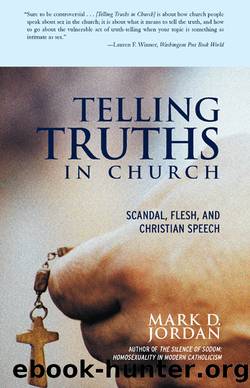Telling Truths in Church by Mark D. Jordan

Author:Mark D. Jordan [Jordan, Mark D.]
Language: eng
Format: epub
ISBN: 978-0-8070-1049-5
Publisher: Beacon Press
Published: 2003-10-15T00:00:00+00:00
Negative Moral Theology
IF NEGATIVE THEOLOGY is comprehensive soul care, how can it be confined by a subdivided theology just to topics in dogmatics or systematics? It cannot, but you will often find attempts to keep it there. The challenge of negative theology will be taken up, if it is not waved away, during discussions of theological method or human knowledge or divine simplicity. Negative theology is typically and I think deliberately not mentioned in typical prologues to Catholic moral theology or Evangelical Christian ethics.3
It is not hard to understand why most Christian ethicists want to keep negative theology at bay. First, negative theology appears to abolish ethics by a blunt rejection of âexceptionless normsâ or, to speak in English, of universal regulations. Negative theology would produce anarchy, and nothing agitates these ethicists like the scent of anarchy. Again, it is hard to see how negative theology could contribute to what many take as the chief task of moral theology or Christian ethics; namely, framing those universal regulations and then applying them to particular cases. After all, ethicists are supposed to tell us what we can and canât do, arenât they? Finally, negative theology sounds terribly obscure, whereas Christian ethics must be clearâclear above allâotherwise, you wonât know what you can and canât do.
There are replies to each of these worries, but let me reply to them together. If our speech about God is gripped tightly by the limits of human language, so too is our language about human beings as creatures who are in the image and likeness of God, who were created for a share in the inmost life of the Trinity. So long as pastoral care means to hasten the journey of human beings to their trinitarian home, the language of pastoral care must recognize itself as afflicted by our inability to describe that Trinity, to narrate its presence in human hearts, to capture the ways it draws human beings to itself. The language of practical theology falls fully under the event or operation of negative theology because human life cannot be narrated except in relation to the unnarratable life of God.
Near love, language ignites or evaporates. When the ablest Christian writers attempt to narrate their loving encounters with God, they do so by falling back on the incandescent languages of erotic passion. There are at least three obvious reasons for this. First, our encounters with God are intense, overwhelming experiences of love, and so we turn to the most compelling languages humans have devised for such experiences. Second, and as we have seen, piercing human love already undoes human languageâalready breaks the grip holding it closed. We fracture language for erotic love; when we need fractured language to talk about God, we pick up language already fractured. Third, more provocatively, it seems that the closest analogy in human experience to divine encounter really is erotic union. Ps-Dionysius goes out of his way to rescue the word eros for Christian use, precisely in comparison with agape.4 I conclude
Download
This site does not store any files on its server. We only index and link to content provided by other sites. Please contact the content providers to delete copyright contents if any and email us, we'll remove relevant links or contents immediately.
Cecilia; Or, Memoirs of an Heiress — Volume 1 by Fanny Burney(32558)
The Great Music City by Andrea Baker(32019)
Cecilia; Or, Memoirs of an Heiress — Volume 2 by Fanny Burney(31956)
Cecilia; Or, Memoirs of an Heiress — Volume 3 by Fanny Burney(31942)
We're Going to Need More Wine by Gabrielle Union(19046)
All the Missing Girls by Megan Miranda(16029)
Pimp by Iceberg Slim(14508)
For the Love of Europe by Rick Steves(14121)
Bombshells: Glamour Girls of a Lifetime by Sullivan Steve(14076)
Talking to Strangers by Malcolm Gladwell(13370)
Norse Mythology by Gaiman Neil(13366)
Fifty Shades Freed by E L James(13243)
Mindhunter: Inside the FBI's Elite Serial Crime Unit by John E. Douglas & Mark Olshaker(9343)
Crazy Rich Asians by Kevin Kwan(9292)
The Lost Art of Listening by Michael P. Nichols(7506)
Enlightenment Now: The Case for Reason, Science, Humanism, and Progress by Steven Pinker(7314)
The Four Agreements by Don Miguel Ruiz(6765)
Bad Blood by John Carreyrou(6622)
Weapons of Math Destruction by Cathy O'Neil(6281)
